(1) DROPPING THE PILOT. “Harry Potter Fans Reimagine Their World Without Its Creator” – the New York Times listened to some fans who are trying to make the division.
…Over the past week, some fans said that they had decided to simply walk away from the world that spans seven books, eight movies and an ever-expanding franchise. Others said that they were trying to separate the artist from the art, to remain in the fandom while denouncing someone who was once considered to be royalty.
“J.K. Rowling gave us Harry Potter; she gave us this world,” said Renae McBrian, a young adult author who volunteers for the fan site MuggleNet. “But we created the fandom, and we created the magic and community in that fandom. That is ours to keep.”
The essay was particularly gutting for transgender and nonbinary fans, many of whom found solace in the world of “Harry Potter” and used to see the series as a way to escape anxiety.
(2) ONE MINNEAPOLIS SFF BOOKSTORE BACK IN BUSINESS. Greg Ketter’s DreamHaven Books has reopened.
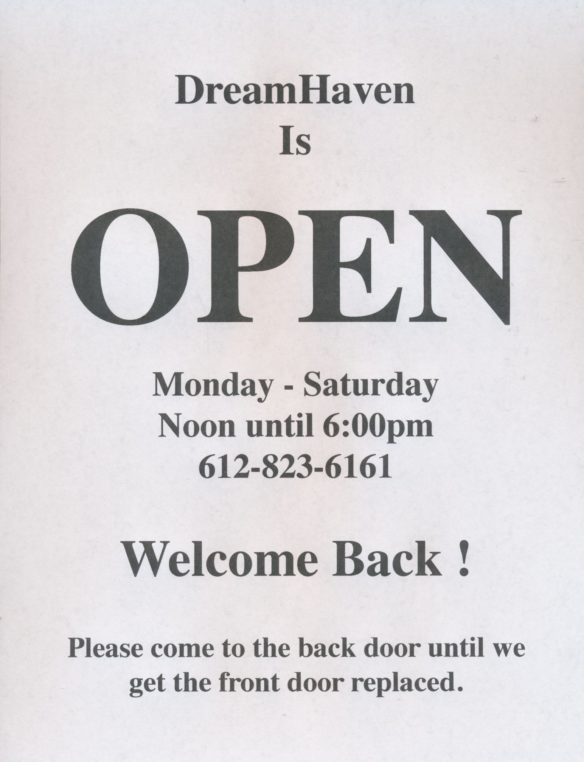
(3) TINY THEOLOGY. The Small Gods series by Lee Moyer (icons) and Seanan McGuire (stories) reported here last month has assembled quite a pantheon in the past few weeks. See them all here.
(4) ESTATE SALE. There are 209 items up for bid in Everything But The House’s “Resnick Estate: Sci-Fi Writer’s World”. Sale continues through June 18.
Born in Chicago in 1942, Mike Resnick always wanted to be a writer. During his prolific career he wrote over 40 science fiction novels, 150 stories, 10 story collections, and edited more than 30 anthologies. Mike’s list of awards and recognitions is lengthy as well; they include 5 Hugo Awards, a Nebula Award, and more than 30 other awards. He was the Guest of Honor at Chicon 7, the 70th Worldcon.
Mike met his soul mate Carol, married at 19, then spent nearly 58 years side by side. In fact, when it came to his writing, Mike once said that “Nothing goes out without Carol (my wife) seeing it, editing it, and making suggestions.”
Please enjoy perusing this unique estate featuring otherworldly art, sci-fi collectibles, books and a peek into Mike & Carol Resnick’s wonderful world.
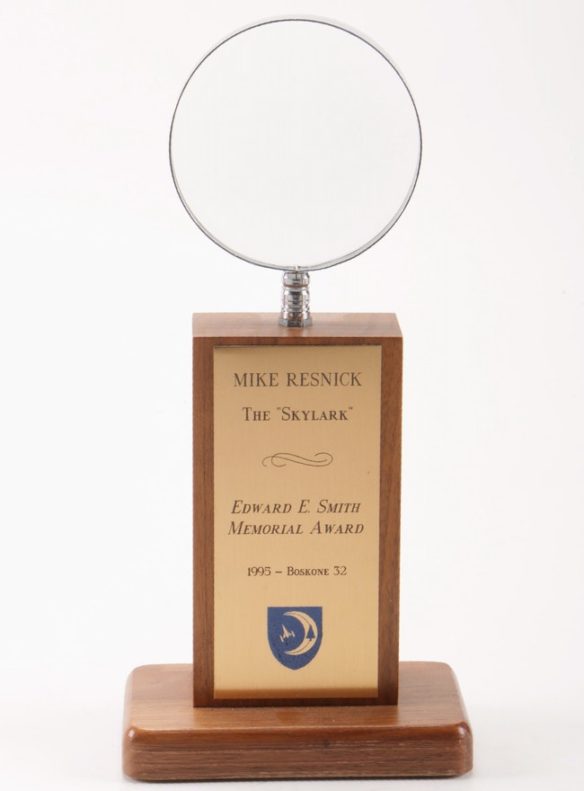
(5) Q&A & BAGELS. Scott Edelman had a vision – that fans should binge on bagels while he finishes answering listeners’ questions at Eating the Fantastic.

It’s been more than three months since I met with Michael Dirda to record the last — though it would be more accurate to instead call it the most recent — face-to-face episode of Eating the Fantastic. Since then, I also shared two episodes recorded remotely — with Sarah Pinsker and Justina Ireland — each with its own special reason for allowing me to step beyond this podcast’s meatspace culinary mandate.
But because it still seems unsafe out there for a guest to meet with me within the walls of the restaurant, you and I are now about to sequester together, just as we did four episodes ago, when we sheltered in place, and two episodes back, when we practiced social distancing.
Thirty questions remained from my original call to listeners and previous guests of the show, and this time I managed to get through all of them.
I answered questions about whether my early days in fandom and early writing success helped my career, which anthology I’d like to edit if given the chance, what different choices I wish I’d made over my lifetime, what I predict for the future of food, how the pandemic has affected my writing, if anything I’ve written has ever scared me, whether writer’s block is a reality or a myth, which single comic book I’d want to own if I could only have one, how often I’m surprised by something a guest says, the life lessons I learned from Harlan Ellison, and much more.
(6) CLARION ALUMS ARE ZOOMING. You are invited to register for the 2020 Clarion Summer Conversations. The first two are —
Join the Clarion Foundation for conversations with writers from the Clarion alumni community about writing science fiction, fantasy, and horror.
This week, our guests are Catherynne M. Valente, Alyssa Wong, and Ashley Blooms, moderated by Karen Joy Fowler.
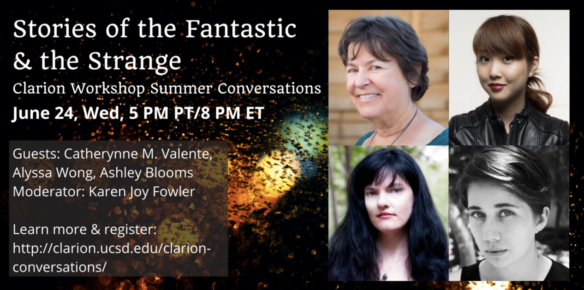
Join the Clarion Foundation for conversations with writers from the Clarion alumni community about writing science fiction, fantasy, and horror.
This week, our guests are Eileen Gunn, Ted Chiang, Lilliam Rivera, and Sam J. Miller, moderated by Kim Stanley Robinson.

(7) FIRST CONTACT. Yesterday, Bill reminded us that the premiere of Forbidden Planet at a 1956 SF convention. The attached photo is from the local news coverage of that event – and includes Bob Madle, whose hundredth birthday we celebrated earlier this month.
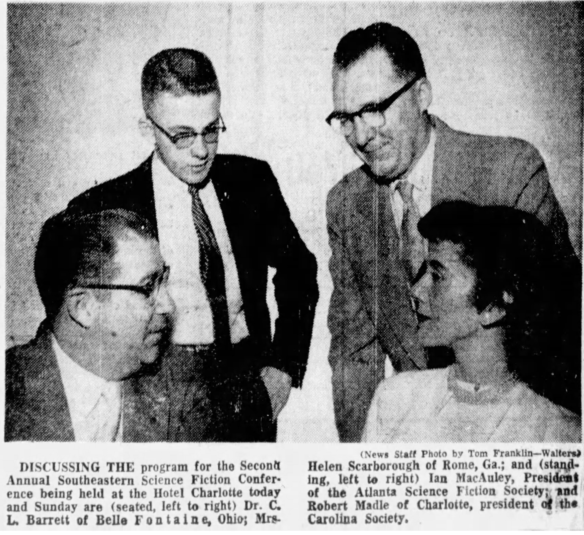
(8) MEDIA BIRTHDAYS.
- June 1965 – Fifty-five years ago this month, Arthur C. Clarke’s Prelude to Mars was published by Harcourt, Brace & World. A hardcover edition of 497 pages, it would’ve cost you $4.95. You got two novels, Prelude to Space and Sands of Mars, plus a novelette, “Second Dawn.” You also got a lot of stories, sixteen in total, many of them from his Tales from The White Hart series.
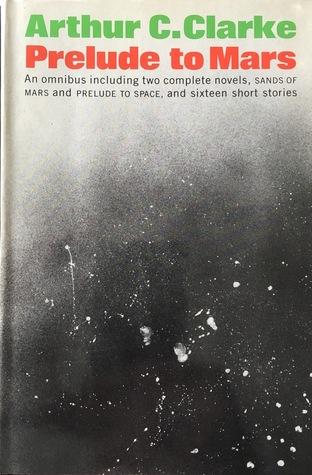
- June 1973 — This month in 1973, Robert Heinlein’s Time Enough for Love was first published. Clarke’s Rendezvous With Rama would beat it out for the Hugo for Best Novel at Discon II. It was given a Prometheus Hall of Fame Award. It’s the life of Lazarus Long told in exhaustive detail. Critics including Theodore Sturgeon loved it, and John Leonard writing for the NYT called it “great entertainment”.
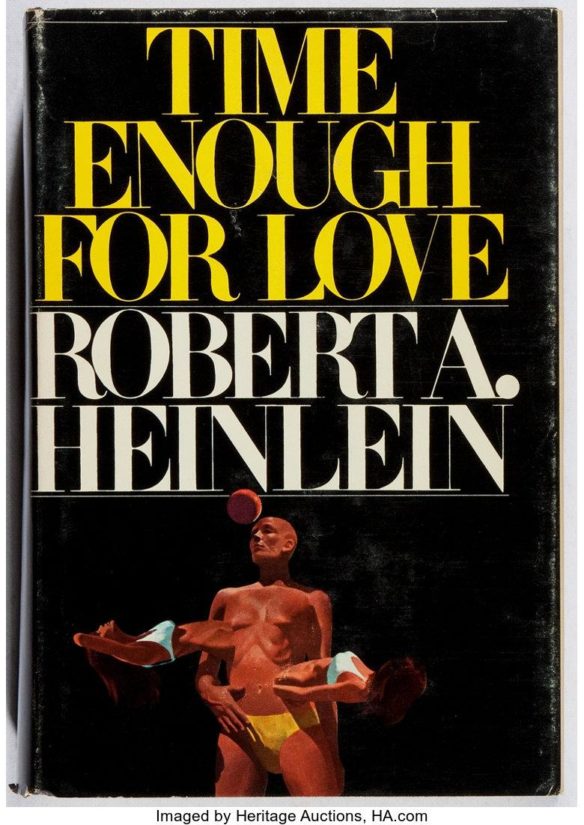
(9) TODAY’S BIRTHDAYS.
[Compiled by Cat Eldridge and John Hertz.]
- Born June 14, 1908 — Stephen Tall. His first published work was “The Lights on Precipice Peak“ in Galaxy, October 1955. Not a prolific writer, he’d do about twenty stories over the next quarter of a century and two novels as well, The Ramsgate Paradox and The People Beyond the Wall. “The Bear with the Knot on His Tail” was nominated for a Hugo. He has not yet made into the digital realm other than “The Lights on Precipice Peak“ being available on iBooks. (Died 1981.) (CE)
- Born June 14, 1914 — Ruthven Todd. He’s here for his delightful children’s illustrated trio of Space Cat books — Space Cat Visits Venus, Space Cat Meets Mars and Space Cat and the Kittens. I’m please to say they’re available at all the usual digital suspects. He also wrote Over the Mountain and The Lost Traveller which are respectively a lost world novel and a dystopian novel. (Died 1978.) (CE)
- Born June 14, 1917 – Maeve Gilmore. British author, painter, pianist, sculptor, notable to us for helping her husband Mervyn Peake, generally and with Titus. After Titus Groan and Gormenghast MP’s health was declining; she halted her own career to give him a hand; he barely finished Titus Alone, published without its final polish. Notes for a fourth book largely illegible. After his death she wrote a memoir A World Away and worked on the notes, then she too was gone. For MP’s birth-centennial in 2011 his children and grandchildren published one of several versions as Titus Awakes. Michael Moorcock said it “successfully echoes the music of the originals, if not the eloquent precision of Peake’s baroque style”. (Died 1983) [JH]
- Born June 14, 1917 – Arthur Lidov. Illustrator, inventor, muralist, sculptor. Did the first cover for The Martian Chronicles. Had already done representational work; here is a 1942 mural Railroading in the Post Office of Chillicothe, Illinois. Here is his work in a 1950 television ad. Also real things in a way that might be called fantastic; here and here are paintings for “How Food Becomes Fuel” in the 7 Dec 62 Life. He still did SF; here is his illustration for “The Cathedral of Mars” (by W. Sambrot; Saturday Evening Post, 24 Jun 61). Here is a 1982 painting Alpha Universe. (Died 1990) [JH]
- Born June 14, 1919 — Gene Barry. His first genre role was in The War of the Worlds as Dr. Clayton Forrester. He’d have a number of later genre appearances including several on Science Fiction Theatre, Alfred Hitchcock Presents, The Devil and Miss Sarah, The Girl, the Gold Watch & Dynamite, multiple appearances on Fantasy Island and The Twilight Zone. He’d appear in the ‘05 War of The Worlds credited simply as “Grandfather”. (Died 2009.) (CE)
- Born June 14, 1921 — William Hamling. Author and editor who was active as an sf fan in the late 1930s and early 1940s. His first story “War with Jupiter”, written with Mark Reinsberg, appeared in Amazing Stories in May 1939. He’d write only short stories, some nineteen of them, over the next twenty years. Genre adjacent, his Shadow of the Sphinx is a horror novel about an ancient Egyptian sorceress. He would be the editor of two genre zines, Imagination for most of the Fifties, and Imaginative Tales during the Fifties as well. He published four issues of the Stardust fanzine in 1940, and contributed to the 1940 Worldcon program. (Died 2017.) (CE)
- Born June 14, 1923 – Lloyd Rognan. After discharge from World War II (Purple Heart in the Normandy landing; served on The Stars and Stripes) and freelancing in Paris he worked for Hamling’s Greenleaf Publications, thus Imagination and Imaginative Tales; a score of covers, a dozen interiors. Here is a biography, with a 1956 cover. Here is a cover from 1957. (Died 2005) [JH]
- Born June 14, 1939 — Penelope Farmer, 81. English writer best known for children’s fantasy novels. Her best-known novel is Charlotte Sometimes, a boarding-school story that features a multiple time slip. There’s two more novels in this, the Emma / Charlotte series, The Summer Birds and Emma in Winter. Another children’s fantasy by her, A Castle of Bone, concerns a portal in a magic shop. (CE)
- Born June 14, 1948 – Laurence Yep. Twenty novels, thirty shorter stories for us; forty more novels; picture books; plays. Ph.D. in English. Newbery Medal; Boston Globe – Horn Book Award for Fiction; Woodson, Phoenix Awards; Wilder Medal (as it then was; career contribution to American children’s literature). Golden Mountain (Chinese immigrants’ name for America, particularly San Francisco) Chronicles, though not ours, valuably tell that story from 1849. “I was too American to fit into Chinatown, and too Chinese to fit in anywhere else.” Married his editor and wrote books with her. Note that dragons, which he writes about, although fantasy in China are quite different there and in the West. Memoir, The Lost Garden. [JH]
- Born June 14, 1949 – Harry Turtledove. Ninety novels, a hundred eighty shorter stories, translated into Dutch, French, German, Italian, Polish, Portuguese, Romanian, Spanish, under his own and other names, and with co-authors. Famous for alternative history; three Sidewise Awards. Best-Novella Hugo for “Down in the Bottomlands”. Toastmaster at Chicon VI the 58th Worldcon. Forry Award. Guest of Honor at – among others – Loscon 23, Deepsouthcon 34, Rivercon 23, Windycon XXII and XXXII, Westercon 55, Eastercon 53 (U.K. nat’l con). Perfectly innocent Ph.D. in Byzantine history which he then used for more fiction. Once while I was moderating “Twenty Questions for Turtledove” audience questions ran out so I made up some; afterward I said “You should thank me”; he said “Certainly; why?” and I said “I didn’t ask Why did Byzantium fall?” [JH]
- Born June 14, 1958 — James Gurney, 62. Artist and author best known for his illustrated Dinotopia book series. He won a Hugo for Best Original Artwork at L.A. Con III for Dinotopia: The World Beneath, and was twice nominated for a Hugo for Best Professional Artist. The dinosaur Torvosaurus gurneyi was named in his honor. (CE)
- Born June 14, 1972 – Adrian Tchaikovsky. Born Czajkowski, living in England. Instead of spelling his namelike any reasonable Pole he agreed to Tchaikovsky for the convenience of English-language readers; then when his books were going to Poland he was stuck with it (“this tale of Frankish ignorance”). Clarke and British Fantasy awards. Honorary Doctorate of the Arts. Nine novels in Shadows of the Apt series, two in Children of Time, three in Echoes of the Fall, five more; eighty shorter stories. Amateur entomologist. [JH]
(10) OFFENSIVE WEAPONRY. ScreenRant made a list to laugh at: “The 10 Most Hilariously Lame Sci-Fi Weapons In Movies, Ranked”.
Sci-fi films have weapons of all sorts and many of them might seem to be impractical or unrealistic but they still continue to fascinate us….
The absolute worst is —
1. Bat-Shark Repellent- Batman: The Movie (1966)
Adam West’s Batman gave a lighthearted avatar to the caped crusader, giving viewers some priceless ‘so bad that it’s good moments’. In 1966’s Batman: The Movie, Batman is escaping from an ocean while Robin pilots the Bat-Plane above. Robin drops a ladder for Batman to climb but right then, a shark charges at the dark knight.
In a calm and composed tone, Batman asks his accomplice to throw him a can of Bat-Shark Repellent. This random item has no match in terms of lameness and creativity.
(11) BAEN PUBLISHES JANISSARIES SEQUEL. The fourth book in Jerry Pournelle’s Janissaries series has been completed posthumously. Baen has a three-part dialog between the writers who finished t.
David Weber and Phillip Pournelle discuss Mamelukes, by Jerry Pournelle. When the late, great Dr. Jerry Pournelle passed away, he left behind the nearly completed manuscript for science fiction novel Mamelukes. Now Pournelle’s son, Phillip Pournelle, and Honor Harrington series creator David Weber have completed the book. This is an entry in Jerry Pournelle’s legendary Janissaries series;
Part I:
Part II:
Part III: The third segment is only in podcast form at this writing:
(12) NEWS TO ME. Puffs “is a stage play written by Matt Cox as a transformative & transfigured work under the magic that is US Fair Use laws.”

Puffs is not authorised, sanctioned, licensed or endorsed by J.K Rowling, Warner Bros. or any person or company associated with the Harry Potter books, films or play.
Here’s the brief description:
For seven years a certain boy wizard went to a certain Wizard School and conquered evil. This, however, is not his story. This is the story of the Puffs… who just happened to be there too. A tale for anyone who has never been destined to save the world.
(13) NEW HORIZONS. “As California Trains 20,000 Contact Tracers, Librarians and Tax Assessors Step Up”.
After more than two months at home, Lisa Fagundes really misses her work managing the science fiction book collection of the San Francisco Public Library. She feels like she’s in withdrawal, longing to see new books, touch them, smell them. “It’s like a disease,” she says, laughing.
But recently, she’s been learning how to combat a different disease: COVID-19. While libraries are closed, Fagundes is one of dozens of librarians in San Francisco training to become contact tracers, workers who call people who have been exposed to the coronavirus and ask them to self-quarantine so they don’t spread it further.
Librarians are an obvious choice for the job, says Fagundes, who normally works at the information desk of the San Francisco Main Library. They’re curious, they’re tech savvy, and they’re really good at getting people they barely know to open up.
“Because a lot of times patrons come up to you and they’re like, ‘Uh, I’m looking for a book –’ and they don’t really know what they’re looking for or they don’t know how to describe it,” Fagundes says.
Or they’re teens afraid to admit out loud that they’re looking for books about sex or queer identity. Fagundes is used to coaxing it out of them in an unflappable, non-judgmental way. Similar skills are needed for contact tracing, which involves asking people about their health status and personal history.
“Talking about sensitive subjects is a natural thing for librarians,” she says. “It’s a lot of open ended questions, trying to get people to feel that you’re listening to them and not trying to take advantage or put your own viewpoint on their story.”
Fagundes is part of the first team of contact tracers trained through a new virtual academy based at the University of California – San Francisco. The state awarded the university an $8.7 million contract in May to expand the academy and train 20,000 new contact tracers throughout California by July — one of the largest such efforts in the country.
(14) CASE SETTLED. Possibly the final word on a Pixel from 18 months ago: “Gatwick drone arrest couple receive £200k payout from Sussex Police”.
A couple arrested over the Gatwick Airport drone chaos that halted flights have received £200,000 in compensation.
Armed police stormed the home of Paul and Elaine Gait in December 2018, and held them for 36 hours after drones caused the airport to close repeatedly.
The couple were released without charge, and sued Sussex Police for wrongful arrest and false imprisonment.
On Sunday, their legal team announced the force had agreed to an out-of-court settlement package.
Sussex Police confirmed it has paid the couple the £55,000 owed in damages, and law firm Howard Kennedy said it has billed the force an additional £145,000 in legal costs.
Flights were cancelled in droves over a three-day period, as police investigated multiple reported drone sightings.
No-one has ever been charged, and police have said that some reported drone sightings may have been Sussex Police’s own craft.Twelve armed officers swooped on Mr and Mrs Gait’s home, even though they did not possess any drones and had been at work during the reported sightings.
(15) VIDEO OF THE DAY. “More Creative Writing And Tips From Stephen King” on YouTube is a 2016 compilation by Nicola Monaghan of writing advice Stephen King has given in lectures at the University of Massachusetts.
[Thanks to Chip Hitchcock, Bill, John King Tarpinian, Martin Morse Wooster, John Hertz, JJ, Cat Eldridge, Mike Kennedy, Michael Toman, and Andrew Porter for some of these stories. Title credit goes to File 770 contributing editor of the day by Anna Nimmhaus.]
Discover more from File 770
Subscribe to get the latest posts sent to your email.

(9) The one and only genre role I’ve seen Gene Barry in was the “L.A. 2017” episode of The Name of the Game; he spends more than an hour’s running time in subsurface Los Angeles (or imagines he does, after getting stuck with his Chrysler in the desert). Directed by Steven Spielberg (as I learned long after seeing the episode in 1971) and written by Philip Wylie.
I am first. What a triumph.
(9) Stephen Tall has an award named for him – sort of: Stephen Tall was the pseudonym of Compton Crook, and every year BSFS gives an award of that name to the best first novel.
I’ve read a lot of Turtledove (20 some novels) but there’s plenty more I haven’t read.
Maybe he got it from Julia Child! (During her OSS career, she worked on a project to develop a shark repellent — which, IIRC, is still in use today!)
Julia Child and Shark Repellent
@8 error: the first part of the Clarke doorstop was Prelude to Space; the book title was the two novel titles merged.
@8: I shouldn’t be surprised that Time Enough to Screw Around got a Hugo nomination, considering other clunkers on the list (cf recent discussion). I wonder whether it actually placed 2nd as shown on the Hugo site; there’s no link for voting data, and I remember … vigorous … arguments not long after about whether the order of the losers should be revealed, so I’m pretty sure it wasn’t published originally — I don’t know whether someone later dug it up.
@9 (Todd): I suspect the “Space Cat” books were aimed at younger kids than (e.g.) Norton, but I remember loving them when I first ran across them.
@Andrew: IMO, not having read all of Turtledove is nothing to be ashamed of; a lot of his stuff seems very cranked out. I liked some of the solo books, e.g. The Guns of the South
@10: there are some pretty bizarre-sounding weapons there, but the riff on Falcon’s wings is nonsense — they aren’t made for high flight AFAICT, and he has to be able to fold them and go hand-to-hand, so an encasing suit would be a hindrance.
I just love the sound of nails grating on the chalkboard when Chip lodges another “error.”
Chip says I shouldn’t be surprised that Time Enough to Screw Around got a Hugo nomination, considering other clunkers on the list (cf recent discussion). I wonder whether it actually placed 2nd as shown on the Hugo site; there’s no link for voting data, and I remember … vigorous … arguments not long after about whether the order of the losers should be revealed, so I’m pretty sure it wasn’t published originally — I don’t know whether someone later dug it up. : I shouldn’t be surprised that Time Enough to Screw Around got a Hugo nomination, considering other clunkers on the list (cf recent discussion). I wonder whether it actually placed 2nd as shown on the Hugo site; there’s no link for voting data, and I remember … vigorous … arguments not long after about whether the order of the losers should be revealed, so I’m pretty sure it wasn’t published originally — I don’t know whether someone later dug it up.
Since the listing for the runner-ups are not in alphabetical order, it’s a logical assumption they’re listed by how many votes they got. Hence I am quite comfortable with saying that a book listed just below that the winner came in second. ISFDB confirms this as they’re are also do this if you sort by Awards won, so the data is being used consistently.
The Space Cat books have been reprinted by Dover Books in rather nice hardcovers.
(8) I have a copy of the SFBC edition of Prelude to Mars. I can’t say that I really remember anything about the two novels, but it does contain one of my absolute favorite Clarke short stories, “A Walk in the Dark”.
Michael J. Walsh’s says The Space Cat books have been reprinted by Dover Books in rather nice hardcovers.
Yeah I noticed that when I was sussing out if they had epubs. Dover did both the epubs and the hardcovers, something fairly unusual for that publisher to do. I assume these are from the original plates.
(3) I’ve been enjoying these, and am looking forward to more.
Lost another furry friend. Gandalf was 17, a long tall dark gray cat with bright green eyes. He’d been a thin tired old cat for several years; a bunch of tests early last year didn’t find any of the usual problems. In the past week or so he went from thin to skeletal and very weak. He started refusing treats by midweek. Friday night he only ate a couple of bites of his canned food; I was pretty sure I’d be having him put to sleep on Monday. Saturday morning he gave a brief yowl from beside my bed, waking me. When I turned on the light and checked on him, he was gone.
Anne,
I’m sorry for your loss.
Annne, I’m sorry for your loss too. I had one go that way earlier this year. She just stopped eating and I found her passed on when I came back from being out one morning. She was around thirteen years old.
Anne, so very sorry for your loss.
@Anne Sheller, I am so sorry for the loss of your furry friend 🙁
Anne & Cat — Condolences from me & my boy Jin. And I also went through something similar with Jin’s brother Mugen (age 13-ish) last month — he had lost a lot of weight, the vet wasn’t able to find anything specific wrong with him, and over the space of a couple of days he just … went.
I’ve had a long, serious talk with his brother about the importance of staying in good health for the next several years.
@Contrarius: the Youtube series Reactions (from PBS and the American Chemical Society) concludes that the shark repellents, including Childs’s copper acetate, didn’t work very well and was declared useless in the 1970s.
It’s an interesting history!
@OGH: See ISFDB; I tend to read “typo” as a single character.
Anne, so sorry for your loss. 🙁
@amk —
Hey, don’t harsh on my Julia Child stanning!
😉
@Anne — So sorry to hear about the loss of your friend. Especially in these trying times, we need all the friends we can get!
Anne, my condolences.
(8) The source for the 1974 Hugo ordering appears to be the now-defunct NESFA Long List, which lists the third, second, and first place finishers in each category.
(13) A tangent, but I’m still a bit sad we lost the fairly extensive SF programming that the SFPL was putting together for this spring.
(10) “a can of Bat-Shark Repellent. This random item has no match in terms of lameness and creativity.”
Lame?!?! It worked, didn’t it
@Chip
That’s pretty good. I usually translate the title as Time Enough for Self Love. At the end of the day, it seems like his partners were just iterations of himself.
Regards,
Dann
I don’t think I’ve met anyone with a stronger work ethic than Ray Charles. – Clint Eastwood
Goobergunch: In 1974 the ranking of the top 3 finishers in each Hugo category was released by the convention committee. See for example the October 1974 issue of Luna Monthly.
@OGH: Ah, thanks for that!
@Dann665: Remember the curtain line of “‘All You Zombies–‘””
You really aren’t here at all. There isn’t anybody but me–Jane–here alone in the dark.
I miss you dreadfully!
My condolences on the loss of your beloved companion, Anne. May your good memories lighten grief. ❤
‘The File is come upon me,’ cried the Pixel of Scroll-lott
My sympathies for your loss, Anne.
@Chip:
There’s certainly some that’s not appealing to me – but he has enough solid stuff that I keep thinking I should catch up on it.
I’ve read a Turtledove novel–Hot War–standing in a drug store. It was good, but I did read it standing up in one go. Some of his short fiction, though, has heft.
I’ve heard good things about Guns of the South. If I were to look for a book by him that would live up to “Shtetl Days”–which is a high bar to clear–what would it be?
8) Heinlein hits the solipsism note in the Coda to TEFL, too, and first hit it that I can think of in Beyond This Horizon, in the drugged dreams of Hamilton Felix.
If his writing outlasts his fans–he’s got a good shot, but nothing is certain–that and not the other stuff might be what people of the future take away from his books.
the drugged dreams of Hamilton Felix. ISTM that making solipsism the result of knockout gas — not even a recreational drug — is not exactly endorsing it, but that was back when Heinlein was leaning to the strange side in his personal life, so I won’t try to guess whether he intended it to be taken seriously. TEFL OTOH is self-indulgence.
Thanks, everyone.
@Chip Hitchcock: If solipsism a weren’t running theme throughout the man’s career, I wouldn’t bring up its first appearance in his work and suggest it was meaningful.
Since it was, I do.
The solipsistic scene in BTH happens as Felix is recovering from knockout gas – as I recall, the similar scene in TEFL is after Lazarus is having a near-death experience, so there’s that connection too. There’s no question that solipsistic references are throughout Heinlein’s works – Bootstraps (as mentioned above), “They” (of course), Job (which actually mentions the “Glaroon” from “They”), etc.